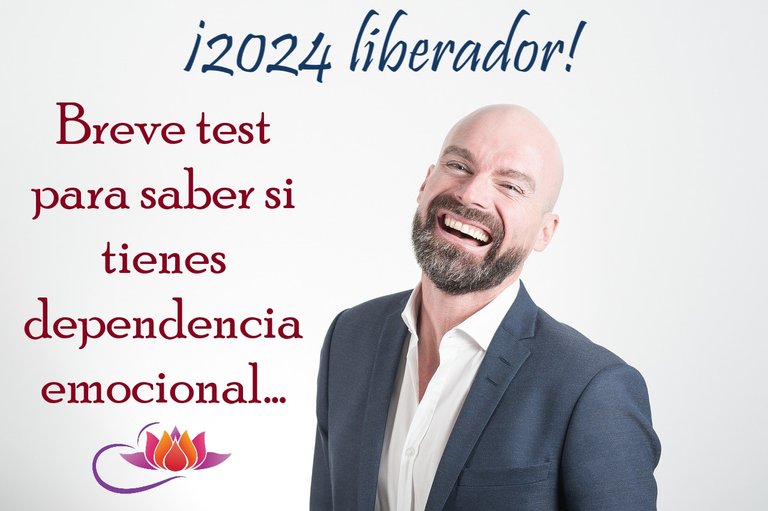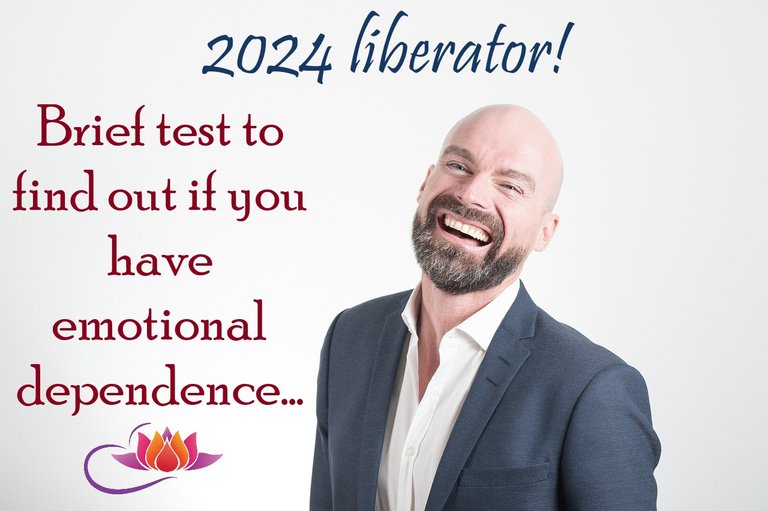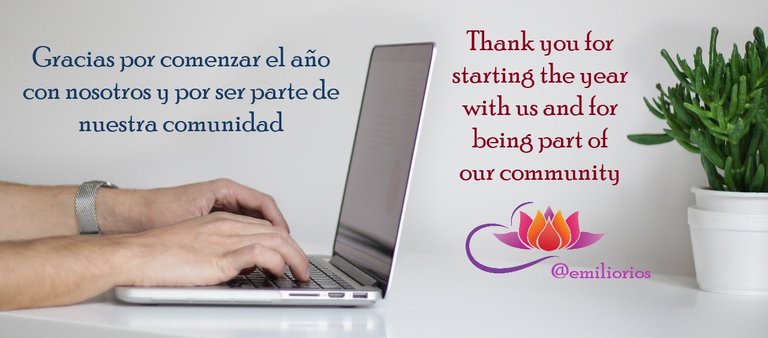

Empezamos el año con múltiples proyectos y objetivos; pero me parece sumamente importante que decidamos dejar de depender emocionalmente.
En diciembre y al menos conozco a varias personas, entre esas yo mismo; nos dimos cuenta de que mucha de nuestra alegría y felicidad dependía de que nuestro entorno estuviese alegre y feliz.
Esto me hizo pensar en cuán dependientes somos emocionalmente.
¿Cuánto necesitamos que los demás sean los que nos aprueben nuestro bienestar?
Lo que sí revela, es un patrón de necesidades emocionales insatisfechas desde la niñez, que es bueno que lo determinemos; y que así, empecemos el año sin ataduras; al menos, emocionalmente hablando.


Aún hay tantas insatisfacciones...
Creo que nos pasamos la vida satisfaciendo necesidades que venimos arrastrando desde la niñez y esto lo buscamos en las relaciones interpersonales, por lo que estrechamos lazos en forma patológica, dependiendo, muchas veces, de la reacción de los demás para poder sentirnos bien.
Cuando el entorno no responde ante nuestras exigencias emocionales, nos sentimos insatisfechos, rechazados y hasta marginados.
No podemos dejar nuestro bienestar emocional en manos de otras personas de nuestro entorno, es más, en manos de nadie, ni siquiera de nuestra pareja.
El que todo funcione bien no depende de nosotros; pero que nuestro interior esté satisfecho y pleno, sí depende íntegramente de nuestras decisiones, de nuestro autodescubrimiento y de nuestra responsabilidad.

Un test rápido para saber si hay tendencia a la dependencia
Saber si tengo una tendencia a la dependencia emocional o ante cualquier relación, es importante para poder trabajar mis afectos.
Este test es sencillo y tiendo a aplicarlo a las personas que van a la consulta con problemas por rupturas de lazos afectivos, pues, son afirmaciones directas que, de por sí, te ponen a pensar.
Trata de identificarte o no, con honestidad, en forma afirmativa, negativa o “puede ser”; pero, sobre todo, trata de observar qué sientes cuando lees cada una de ellas:

TEST:
1.- La ruptura de parejas anteriores ha sido difícil para mí, y me han sumido en tristeza y llanto, pierdo mucho tiempo para salir de estas relaciones.
2.- En mis relaciones de pareja y con mis familiares más cercanos, tiendo a desvivirme para complacerlos; me gusta que se sientan bien, felices y contentos; y dejo de hacer cosas para mí por servirles.
3.- Suelo tomar las críticas en forma fatal; tengo la sensación de que la gente no hace el esfuerzo necesario para comprenderme.
4.- Se tiende a repetir el patrón de personas que están a mi alrededor; ellas son más bien frías, que piensan solo en ellas, arrogantes y hasta llegan al extremo de ser egoístas.
5.- Muy pocas veces he estado solo; generalmente he tenido siempre mejores amigos, primos muy cerca de mí, o siempre he tenido pareja.
6.- Soy de las personas cuyas amistades le reclaman porque cuando estoy en pareja me olvido completamente de ellos.
7.- Soy uno de los que siente mariposas cuando conoce a alguien; y me ilusiono mucho, llegando a descuidar y a bajar mi rendimiento en los estudios y a nivel laboral.
Respuestas:
Las respuestas de identificación o afirmativas ante estas frases, te dan el puntaje más elevado; mientras que las de duda, deben ponerte a trabajar en eso.
Este test es propio y no tiene una validación formal; pero, por la claridad de las afirmaciones, nos alertan hacia la existencia o propensión al apego y a la dependencia emocional hacia otros.


Adicción emocional
Algunos psicólogos hablan de adicción afectiva, por lo que, sabemos que existe cuando hay dependencia emocional de otros y causamos muchos problemas a las personas por exceso de apego.
Esto revela una baja autoestima y una disfuncional habilidad para resolver conflictos.
Ya sea, en relaciones de pareja, amistad o familiares, las dependencias afectivas ocasionan muchísimo sufrimiento para la persona que la vive, pero también, para las personas que la rodean.
Definitivamente, debes reconocer el problema y aceptar la incertidumbre de, qué hacer para superarlo.
La imposición de límites es necesaria, por lo tanto, debemos aprender, como primer paso, a decir que no, pensando primero en nosotros.
El reforzamiento de la autoestima es necesario para poder salir de este problema de dependencia; por eso, observa tus propias creencias, cuestiónate acerca de lo que crees sobre el amor, la amistad y la familia.
Cuestiona tus conceptos sobre la soledad o el estar soltero y sobre el ser independiente; y aclara estos conceptos para ti.
Una de las formas para salir de la dependencia emocional es cultivar una vida social con respeto; y jamás aislarte.
Y si no es posible resolver con estas sugerencias, debes recurrir a la ayuda psicológica o psicoterapéutica.

Empecemos bien el 2024, evaluándonos
Si bien, en diciembre hicimos una limpieza profunda de todas las cosas que nos molestaban o que ya no utilizábamos, y que tal vez hicimos reflexiones acerca de nuestro bienestar físico y emocional; a partir de este mes debemos proponernos a reajustar cuentas con nosotros mismos y a revisar conductas que no nos dejan nada positivo.
Debemos cambiar la insatisfacción y la frustración, estudiándolas y afrontándolas; comenzar a observar nuestros patrones de apego y nuestras inseguridades.
Pero también a cambiar ideas que tenemos sobre el amor y la amistad.
La posesión es algo que no nos podemos permitir como seres humanos, porque esto está ocasionando muchísimos problemas de violencia en el mundo.
Te invito, a que leas los artículos de nuestra comunidad de @holos-lotus, donde cuestionamos importantes aspectos como inseguridades, el miedo y las herramientas que tenemos para salir adelante y lograr un mejor bienestar general.


Start 2024 without emotional dependencies -A brief test to define them-


We start the year with multiple projects and goals; but it seems to me extremely important that we decide to stop being emotionally dependent.
In December and at least I know several people, including myself; we realized that much of our joy and happiness depended on our surroundings being joyful and happy.
This got me thinking about how emotionally dependent we are.
How much do we need others to be the ones to approve of our well-being?
What it does reveal, is a pattern of unmet emotional needs from childhood, which is good for us to determine; and thus, start the year untethered; at least, emotionally speaking.


There are still so many dissatisfactions...
I believe that we spend our lives satisfying needs that we have been dragging along since childhood and this is what we seek in interpersonal relationships, so we form bonds in a pathological way, depending, many times, on the reaction of others in order to feel good.
When the environment does not respond to our emotional demands, we feel dissatisfied, rejected and even marginalized.
We cannot leave our emotional well-being in the hands of others around us, indeed, in the hands of no one, not even our partner.
Whether everything works well does not depend on us, but whether our inner self is satisfied and fulfilled depends entirely on our decisions, our self-discovery and our responsibility.

A quick test to know if there is a tendency to dependence
To know if I have a tendency to emotional dependency or to any relationship, it is important to be able to work on my affections.
This test is simple and I tend to apply it to people who come to the consultation with problems due to the rupture of emotional ties, because they are direct statements that, in and of themselves, make you think.
Try to identify yourself or not, honestly, in an affirmative, negative or "may be" way; but, above all, try to observe what you feel when you read each one of them:

TEST:
1.- The breakup of previous partners has been difficult for me, and they have plunged me into sadness and crying, I waste a lot of time to get out of these relationships.
2.- In my relationships as a couple and with my closest relatives, I tend to go out of my way to please them; I like them to feel good, happy and content; and I stop doing things for myself in order to serve them.
3.- I tend to take criticism in a fatal way; I have the feeling that people do not make the necessary effort to understand me.
4.- I tend to repeat the pattern of people who are around me; they are rather cold, who think only of themselves, arrogant and even go to the extreme of being selfish.
5.- Very few times I have been alone; generally I have always had best friends, cousins very close to me, or I have always had a partner.
6.- I am one of those people whose friends complain because when I am in a couple I completely forget about them.
7.- I am one of those who feel butterflies when I meet someone; and I get very excited, getting to neglect and lower my performance in my studies and at work.
Answers:
The answers of identification or affirmative answers to these sentences, give you the highest score; while those of doubt, should put you to work on that.
This test is self and does not have a formal validation; but, by the clarity of the statements, they alert us to the existence or propensity to attachment and emotional dependence on others.


Emotional addiction
Some psychologists speak of affective addiction, so, we know that it exists when there is emotional dependence on others and we cause many problems to people by excessive attachment.
This reveals a low self-esteem and a dysfunctional ability to resolve conflicts.
Whether in couple, friendship or family relationships, affective dependencies cause a lot of suffering for the person who lives it, but also for the people around them.
Definitely, you must recognize the problem and accept the uncertainty of what to do to overcome it.
The imposition of limits is necessary, therefore, we must learn, as a first step, to say no, thinking first of ourselves.
The reinforcement of self-esteem is necessary to be able to get out of this problem of dependence; therefore, observe your own beliefs, question yourself about what you believe about love, friendship and family.
Question your concepts about loneliness or being single and about being independent; and clarify these concepts for yourself.
One of the ways out of emotional dependency is to cultivate a social life with respect; and never isolate yourself.
And if it is not possible to solve with these suggestions, you should resort to psychological or psychotherapeutic help.

Let's start 2024 well, evaluating ourselves
Although in December we did a deep cleaning of all the things that bothered us or that we no longer used, and perhaps we made reflections about our physical and emotional well-being; starting this month we must propose to readjust accounts with ourselves and to review behaviors that do not leave us with anything positive.
We must change dissatisfaction and frustration, studying them and facing them; begin to observe our attachment patterns and our insecurities.
But also to change ideas we have about love and friendship.
Possession is something that we cannot allow ourselves as human beings, because this is causing many problems of violence in the world.
I invite you to read the articles of our community @holos-lotus, where we question important aspects such as insecurities, fear and the tools we have to move forward and achieve a better overall well-being.

Emilio Ríos – Venezuela
@emiliorios


Barras separadoras y logo de English, creadas y editadas en Paint.
Separator bars and English logo, created and edited in Paint.Cintillo personalizado de @emiliorios con el logo de #Hive, realizado por la excelente creadora @mosa71
Custom @emiliorios headband with the #Hive logo, made by the excellent creator @mosa71Nuevo logo de Twitter tomado de la plataforma de la red social.
New Twitter logo taken from the social network platform.Imagen de agradecimiento, tomando el logo de nuestra comunidad y editada en Paint, de:
Thank you image, taking our community logo and edited in Paint, by:
Pixabay-PexelsLogo de la comunidad utilizado en las imágenes, de:
Community logo used in the images, from:
Pixabay-2405360Si lo deseas, puedes seguirnos en:
If you wish, you can follow us at:





